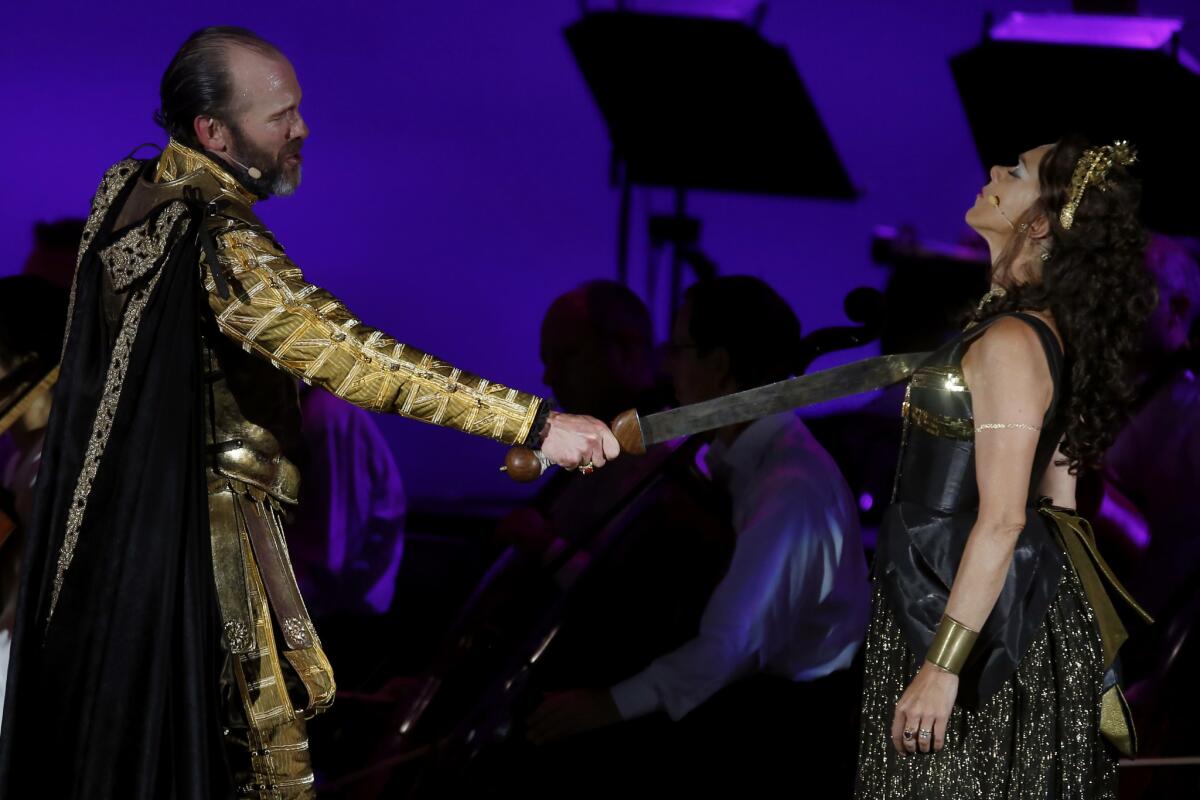Review: Shakespeare at the Bowl is much ado but about what?

- Share via
If music be the food of love, play on.
Please.
That oft-cited line from “Twelfth Night” was not spoken during the Los Angeles Philharmonic’s “Shakespeare at the Bowl” Tuesday night. But the sentiment surely was appreciated as British actors from Shakespeare’s Globe joined the orchestra at the Hollywood Bowl for a strange, melodramatic program that looked at three pairs of Shakespeare’s lovers — Antony and Cleopatra, Beatrice and Benedick (from “Much Ado About Nothing”) and Romeo and Juliet.
The occasion was — as Bill Barclay, the music director of Shakespeare’s Globe and the adapter of the evening’s concert, put it in the program notes — a “celebration” of the 400th anniversary of Shakespeare’s death, although conductor Bramwell Tovey took pains to tell the audience that maybe celebration isn’t exactly the right word. What is the right word? That proved to be an existential issue.
The first and most important half of the program, which was directed by Iqbal Khan, was presented as scenes from “Antony and Cleopatra” with music by Florent Schmitt, whom Bradley’s notes described as “the best French composer you’ve never heard of.” Well, some have heard of him. Among Schmitt’s champions include such music directors in America as Yannick Nézet-Séguin (Philadelphia Orchestra), Thierry Fischer (Utah Symphony) and Leon Botstein (American Symphony). JoAnn Falletta has a new recording of Schmitt’s two “Antoine et Cléopâtre” suites with her Buffalo Philharmonic.
Those suites were adapted by the composer from the entr’actes he wrote for a famous 1920 Paris production of Shakespeare’s play, with a French translation by André Gidé. These were apparently primarily ballet numbers for the production, which starred the exotic Russian ballerina and actress Ida Rubinstein.
A word about Schmitt. He was a highly regarded French composer of modernist bent (with elements of Stravinsky, Ravel and Scriabin imaginatively combined). His works, though, went out of fashion when he became a collaborator during World War II.
Back in the day when men were men and critics were critics, Schmitt also happened to be a music critic with a booming voice. Too impatient to wait for print, he notoriously shouted his irate reactions directly at singers in the opera house.
I’m sorry to say I missed my chance Tuesday, although it would have been hard to be heard in an amphitheater as large as the Bowl and against loudly amplified actors who blared their lines with an insistence that every word Shakespeare wrote need reverberate with leaden prophetic awe.
Where to begin? How about the costumes? Antony sported a gold breastplate suitable for “Monty Python and the Holy Grail.” Cleopatra went in for a slit leg number. Large lavalier microphones against the actors’ cheeks, magnified on the Bowl’s large color-saturated video screens, completed the look.
Not only did reducing a highly effective atmospheric and orgiastic dance score to background music not only diminish the strength of Schmitt’s music, but having it serve the original Shakespeare, not Gidé’s more rapidly enunciated French, made an inaccurately lumbering impression. Simon Paisley-Day and Janie Dee orated in grand manner, except when they threw themselves at each other. Was it Shakespeare who wrote: “No sex please; we’re British”?
Erich Wolfgang Korngold’s flavorful incidental music was selected for “Much Ado About Nothing,” a bow to an early film composer for Shakespeare in Hollywood. Dee’s hard-edged Beatrice made me think of Schmitt, the critic. Paisley-Day’s Benedick took all to heart, but there was a comic side to him. In a skit with Tovey, who show the actors how wry humor is done, Paisley-Day took over the podium.
A quick cut, without much ado about anything, led incongruously to “Romeo and Juliet.” As Mercutio, Brendan O’Hea gave a ponderous account of Queen Mab, followed by Berlioz’s incandescent “Queen Mab Scherzo.”
Then Nino Rota’s sentimental score written for Franco Zeffirelli’s “Romeo and Juliet” film accompanied the balcony scene with Tom Kanji, a heavy-handed Romeo, and Cassie Layton, a girlishly self-conscious Juliet. Finally Tovey ended with Tchaikovsky’s “Romeo and Juliet” Overture, played fast and light as though not to make a long evening that much longer.
There were other composers, especially from the film world, who might have been worth attention. Mario Castelnuovo-Tedesco, mentor of John Williams and André Previn, was a wonderful Shakespearean. Patrick Doyle wrote better music for Kenneth Branagh’s “Much Ado About Nothing” movie than Korngold.
Schmitt did at least get a hearing of sorts. But for a true Shakespearean touch when this program is repeated Thursday, it might be a nice touch to invite the ghost of this composer/critic, like Hamlet’s father, to appear and bellow his two-cents’ worth.
‘Shakespeare at the Bowl’
Where: The Hollywood Bowl
When: 8 p.m. Thursday
Tickets: $8 - $113
Info: (323) 850-2000 or www.hollywoodbowl.com
More to Read
The biggest entertainment stories
Get our big stories about Hollywood, film, television, music, arts, culture and more right in your inbox as soon as they publish.
You may occasionally receive promotional content from the Los Angeles Times.











